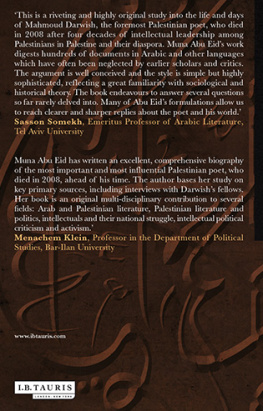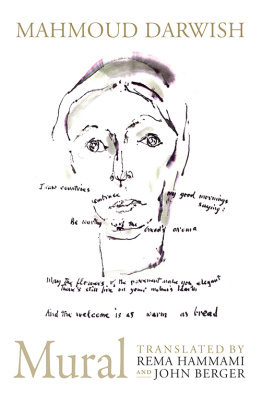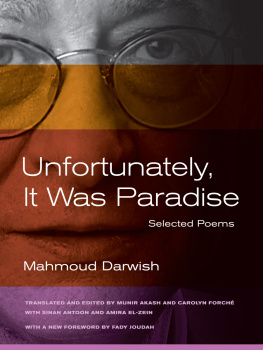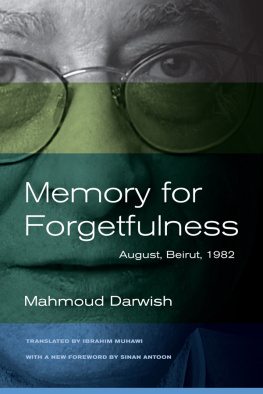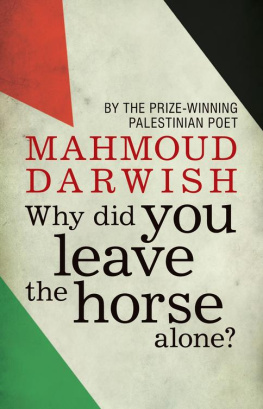

Directors Choice
Our Directors Choice program is an opportunity to highlight a book from our list that deserves special attention. This work celebrates the emergence of a vibrant Palestinian cultural scene of visual artists, filmmakers, performance artists, and poets. It highlights the vital importance of artistic expression to communicate and transform experiences of dislocation and shifting identities.
Alice Randel Pfeiffer
Director, Syracuse University Press

Copyright 2015 by Syracuse University Press
Syracuse, New York 13244-5290
All Rights Reserved
First Edition 2015
15 16 17 18 19 20 6 5 4 3 2 1
The paper used in this publication meets the minimum requirements of the American National Standard for Information SciencesPermanence of Paper for Printed Library Materials, ANSI Z39.48-1992.
For a listing of books published and distributed by Syracuse University Press, visit www.SyracuseUniversityPress.syr.edu.
ISBN: 978-0-8156-3408-9 (cloth) 978-0-8156-5341-7 (e-book)
Library of Congress Cataloging-in-Publication Data
Rahman, Najat.
In the wake of the poetic : Palestinian artists after Darwish /
Najat Rahman. First edition.
pages cm (Contemporary issues in the Middle East)
Includes bibliographical references and index.
ISBN 978-0-8156-3408-9 (cloth : alk. paper) ISBN 978-0-8156-5341-7 (e-book)
1. Darwish, MahmudCriticism and interpretation.
2. Darwish, MahmudAppreciation. 3. Arts, Palestinian. I. Title.
PJ7820.A7Z8265 2015
892.7'16dc23 2015022659
Manufactured in the United States of America
To the memory of Mahmoud Darwish, the poet,
To the writers and scholars of his generation,
And to the artists after him and in his wake,
who create in the face of devastation,
restoring beauty and meaning,
profoundly touching our lives
And to all those
whose lives have had to contend
in no small part with history
and with loss
Table of Contents
Guide
Contents
Illustrations
Acknowledgments
I would like to express my deep and infinite gratitude to Deanna McCay at Syracuse University Press for her strong support of this book, for her tremendously generous and careful guidance with the process of publication. I also warmly thank the team at Syracuse University Press and its director, Alice Randel Pfeiffer, who honored this book as her Directors Choice for fall 2015. Special thanks to Brendan C. Missett for seeing the project through to its publication with Kay Steinmetz, to Mary Petrusewicz for her meticulous editing work, to Fred Wellner for his beautiful work on the cover, and to Lisa Kuerbis, Jessica LeTourneur Bax, and Cathy Goddard for their critical support of the book. I am indebted to the anonymous reviewers and readers of the manuscript, whose exceedingly careful and insightful reading offered me valuable feedback that guided me to improve it.
The generous support of the European Institutes for Advanced Study (EURIAS), in the form of research fellowship, and of the Mediterranean Institute for Advanced Research (IMRA) at the University of Aix-Marseille granted me a year of residency that allowed me the needed time and the stimulating environment to complete this book. Thanks to Richard Jacquemond, who was my scientific referent in Marseille, Nicolas Morales, Kenneth Brown, and Thierry Fabre for the helpful links that facilitated my work. I also thank the residents at IMRA for the many intellectual exchanges and camaraderie, especially William Kornblum, Malik Nejmi, Mike Osborne, and Daniele Santoro.
I am grateful to Jean-Pierre Marquis and Simon Harel at the Universit de Montral for supporting my research in granting me an essential sabbatical that allowed me to make use of the EURIAS grant and to complete this project in a timely manner.
Earlier grants from Canadas Social Science and Humanities Research Council (SSHRC) and Fonds du Qubec sur la socit et la culture (FQRSC), respectively, have enabled me to pursue work on humor and multilingualism in Middle Eastern cultural production, which are also features of this book.
The following institutions have invited me at various stages of this research: Fondation Maison des sciences de lhomme in Paris, Universit Aix-Marseille, Centre dtudes internationales lUniversit de Montral (CRIUM) and the Department of English Studies at the Universit de Montral, the Islamic Institute at McGill University, Najah University, Birzeit University, Dar al-Kalima in Bethlehem, the University of WisconsinMadison, New York University, The New School, and Johns Hopkins University in collaboration with Paris XIII and CRASC in Oran, Algeria. Special thanks to Dr. Yahya Jaber.
The artists in this volume have been very generous in sharing their work: Suheir Hammad, Ghassan Zaqtan, Rashid Masharawi, Elia Suleiman, Mona Hatoum, Sharif Waked, Steve Sabella, Till Roeskens, Rehab Nazzal, Tamer Naffar and his group DAM. I am especially indebted to Eman Haram, whose beautiful image of an ancient olive tree was also offered for the cover of the book. The dialogue with Eman has been substantial and meaningful. Her artistic and intellectual visions have profoundly touched me. Liana Badr has offered generously her time, her works, and her thoughts in my visits to Ramallah in the last two years.
Livia Monnet has been an exemplary mentor and colleague, and I am indeed indebted to her. She has been an intellectual inspiration and a most stimulating interlocutor to me throughout this project and since the beginning of my career at the Universit de Montral. Special thanks also to Norma Rantisi and Wilson Jacob, who have been tremendously supportive. And to Philippe Despoix for his early interest in my work. I thank my colleagues in Montreal for the intellectual camaraderie, especially Khalid Medani, Setrag Manoukian, Christine Tappolet, Christian Nadeau, Amaryll Chanady, and Jean-Claude Guedon.
I would like to acknowledge Mary Layoun and Prospero Saiz for their mentorship and for supporting my work on Darwish, but also Luis Madureira. The work of Judith Butler and Hamid Naficy have especially accompanied me in my reflections. I acknowledge the many interlocutors of Darwishs writing who enrich my work, especially Ibrahim Muhawi, Jeff Sacks, and Muhammed Siddiq.
Special thanks to Michelle Woodward, whose research help has been most invaluable at the last stages of this project, and to Mlanie Deit for all her help throughout the years and beyond the call of duty.
Warm thanks to my students and research assistants who contributed to this book through their insights, ideas, diligent research, enthusiasm, and good humor: Rym Khene, Luis Fernando Franco Mendez, Sothea Chhum, Rim Bejaoui, Imen Oueslati, Nomie Crpeau, Charles De Bock, Tassia Trifiatis, and Nizar Ghazzawi.
To my unwavering siblings: Adeeb, Fardouse, Nadia. This book is dedicated also to my nieces and nephews. You passionately inspire me. And to Farha, my grandmother, born before the British mandate and under the Ottoman rule in Palestine, alive and lives, always, in little Kuza, near Nablus. And to Hamdallah and Khadra.
And to Mary, who accompanied my work throughout this last academic journey. And to M., whose warm welcome in the early mornings at a caf in the old port kept me on track.
Next page




